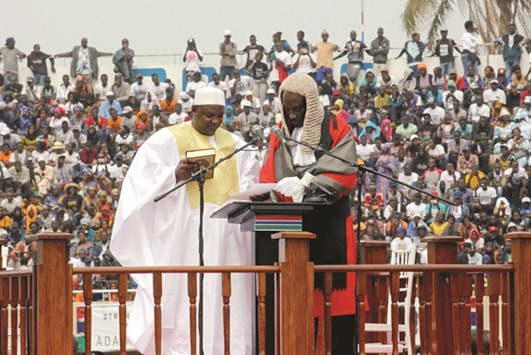Thousands of supporters gathered yesterday to finally celebrate the inauguration of Gambian President Adama Barrow, a month after he was sworn in across the border in neighbouring Senegal during a tense power struggle.
The festivities began in the morning at Independence Stadium in Bakau, west of the capital, and was attended by several African heads of state as well as high-ranking diplomats.
Crowds of hundreds began to gather as early as 3am.
“I spent the night here at the stadium. This is to ensure that I can have a smooth passage inside”, said Isatou Dibba, a Barrow supporter.
US and British diplomats found it difficult to enter the stadium, an AFP correspondent reported, as people who had not been able to get inside massed against a heavy security presence.
Songs and shouts of slogans filled the stadium, where many wore pro-Barrow T-shirts.
The inauguration was taking place on the 52nd anniversary of Gambia’s independence from Britain, shortly after which Dawda Jawara became the West African country’s first president.
Jawara governed from independence in 1965 until the 1994 coup mounted by Yahya Jammeh.
Observers compared the crowd drawn by Barrow to those drawn by Jawara.
“I never expected this to happen, that Gambians will throw such a crowd. But there it is, I am excited. This solidifies our efforts – an embodiment of everything well for the government. I celebrate today as freedom,” said Sheriff Bojang, a journalist who had returned from exile after 15 years.
Barrow, 52, has pledged a new era of governance for Gambia, after Jammeh ruled with an iron fist for more than two decades.
He retook the oath of office he first made at the Gambian embassy in Senegal, whose territory almost entirely surrounds Gambia and whose president, Macky Sall, is seen as Barrow’s closest ally.
The swearing-in ceremony on January 19 was held at a fraught time for the tiny west African nation, as Jammeh was refusing to step aside and acknowledge the result of the election Barrow won several weeks earlier.
Senegal spearheaded efforts to deploy west African troops in Gambia after Jammeh’s departure, in order to secure a country whose military forces were riven with factions still loyal to the ex-leader.
Around 500 Senegalese, Ghanaian and Nigerian soldiers remain in the country and helped provide security for the celebrations yesterday.

Barrow holds the Qur’an during the swearing-in ceremony, presided by Chief Justice Hassan Jallow, at the Independence Stadium in Bakau.
